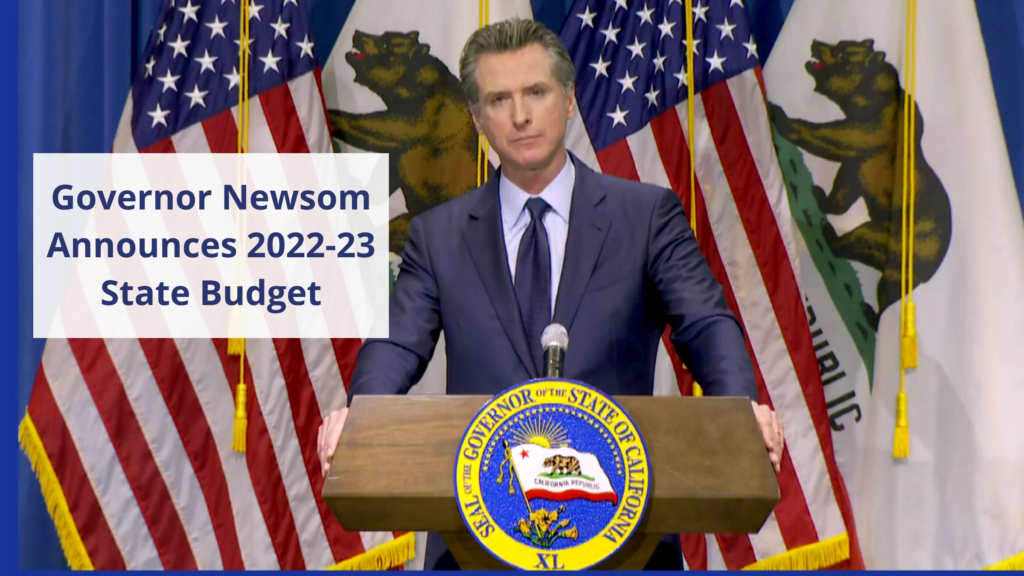
| Governor Newsom released his 2022-23 budget blueprint. The budget projects a significant surplus of more than $45 billion, of which $20 billion is discretionary, $16.1 billion is dedicated to additional Proposition 98 payments for K-14 education, and $9 billion dedicated for reserve deposits and supplemental pension payments. The governor warned, however, that these numbers could change substantially as state revenues are realized in spring and presented in the Governor’s May Revise budget. The proposed budget will now be debated by the legislature and a final budget will be sent to the governor for approval in June. Below is a summary of the governor’s proposed budget and its impact on Californians with intellectual and developmental disabilities and their families:
Total Fund (TF) = state + federal funding. General Fund (GF) = only the state’s portion. Regional Center Services The proposed budget estimates regional center caseload growth to 408,000 clients and a total budget of $12.4 billion TF ($7.5B GF). Budget highlights include: • Provider Rates and Rate Study – This Budget continues to implement the historic DDS investments made in last year’s Budget Act, including an estimated $1.2 billion General Fund investment by 2025-26 to fully implement the Department of Developmental Services (DDS) rate study, and prioritize system stability, workforce development, service access and equity, and outcome-based initiatives. • Early Start: Part C to B Transitions —$65.5 million ($45.1 million General Fund) to strengthen the transition process for three-year-old children with intellectual and/or developmental disabilities moving from the Early Start program (Part C of the federal Individuals with Disabilities Education Act (IDEA)) to special education (Part B of IDEA). This funding supports service coordinator-to-child caseload ratios, supports to preschools to increase inclusion of children served by regional centers, establishment of IDEA specialists at each regional center, and resources to facilitate interagency coordination. See the Early Childhood Chapter for more details. (see next section below for more details)
Improving Services to Young Children with Disabilities When young children receiving Early Intervention Services (pursuant to Part C of the federal Individuals with Disabilities Education Act (IDEA)) turn three, they are often eligible to receive school-age special education services from a local education agency (pursuant to Part B of IDEA). This process of transitioning from early start services (Part C) to school-age services (Part B) is often challenging for children and families. In order to improve early childhood services for children from birth through age five, including children transitioning to special education service at three or entering kindergarten at five who have or are at risk for an intellectual or developmental disability, the Budget includes the following investments:
Special Education Building on last year’s investments, the Budget proposes an additional $500 million ongoing Proposition 98 General Fund for the special education funding formula, paired with the following policy changes to further the state’s commitment to improving special education instruction and services:
Summer Learning & Early Learning Summer Learning Programs – Last year’s Budget Act provided $1 billion ongoing funds and $754 million one-time Proposition 98 General Fund for the Expanded Learning Opportunities Program, which by 2025-26 will provide all students in low-income communities with no-cost access to nine hours of developmentally appropriate academics and enrichment activities per instructional day and for six weeks each summer. This Budget proposes an additional $3.4 billion ongoing Proposition 98 General Fund for the Expanded Learning Opportunities Program, increasing per pupil funding for the program and expanding the number of local educational agencies offering no-cost services. Early Learning – The Budget proposes $639.2 million General Fund to expand eligibility for transitional kindergarten, from all children turning five-years-old between September 2 and December 2 to all children turning five-years-old between September 2 and February 2, beginning in the 2022-23 school year. The Budget also re-envisions State Preschool for families. While some families will choose to send their four year-old to transitional kindergarten, others will have the choice to access State Preschool. The Budget invests $197.8 million Proposition 98 General Fund and $110.6 million General Fund to increase State Preschool Program adjustment factors for students with disabilities and dual language learners. These adjustment factor increases are intended to fund new requirements for State Preschool providers to: (1) serve at least 10 percent students with disabilities, and (2) provide additional supportive services for dual language learners. SSI/SSP The Budget assumes an additional SSP increase of 24 percent, effective January 1, 2024, resulting in an estimated $296 million General Fund in 2023-24 and $593 million ongoing. The increase is projected to bring maximum SSI/SSP grant levels to $1,123 per month for individuals and $1,940 per month for couples in 2024. IHSS IHSS Permanent Back-up Provider System—The Budget includes $24.8 million ($11.2 million General Fund) ongoing to establish a permanent back-up provider system for IHSS recipients to avoid disruptions to caregiving due to an immediate need or emergencies. Healthcare Expansion of Medi-Cal to All Income-Eligible Californians – Over the last decade, the Medi-Cal program has significantly expanded and changed, due in large part to the implementation of the federal Patient Protection and Affordable Care Act and California’s expansions of Medi-Cal coverage to children, young adults, and older adults age 50 and over regardless of immigration status. The Budget builds on those expansions and includes $819.3 million ($613.5 million General Fund) in 2023-24 and $2.7 billion ($2.2 billion General Fund) annually at full implementation, inclusive of In-Home Supportive Services (IHSS) costs, to expand full-scope eligibility to all income-eligible adults aged 26 through 49 regardless of immigration status. Beginning no sooner than January 1, 2024, Medi-Cal will be available to all income-eligible Californians. |
